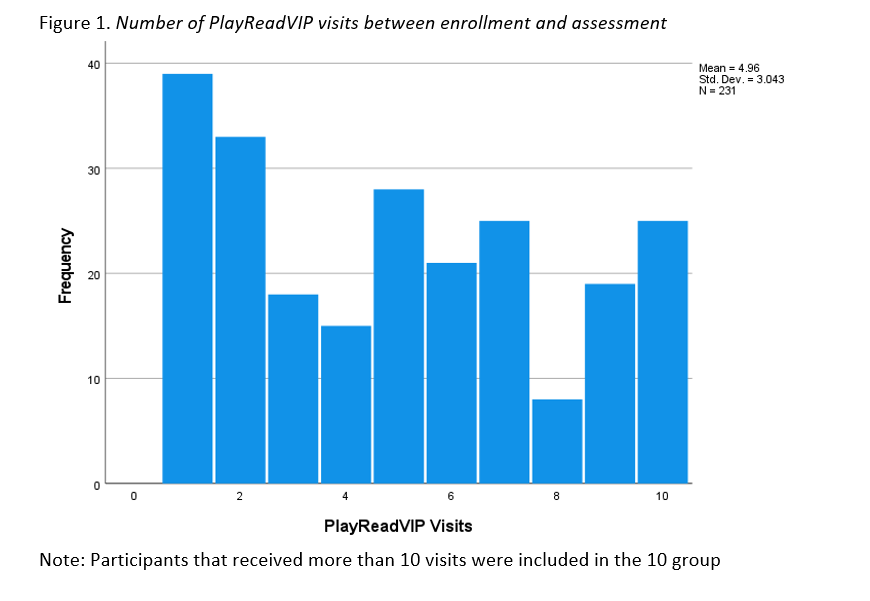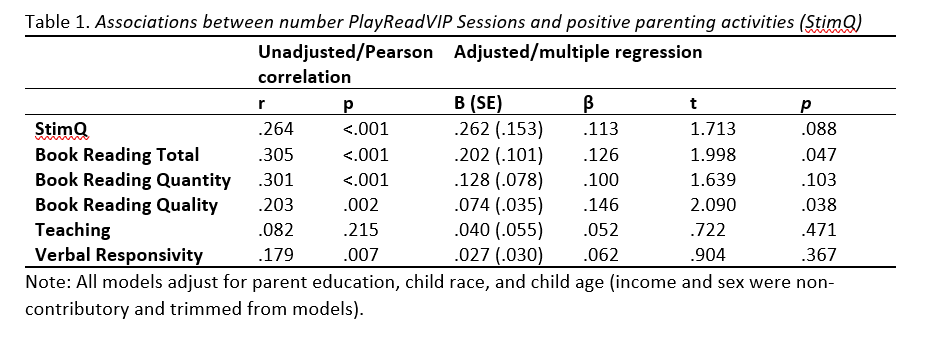Developmental and Behavioral Pediatrics 1: Parenting
Session: Developmental and Behavioral Pediatrics 1: Parenting
777 - Real-world Implementation of PlayReadVIP within The Pittsburgh Study Citywide Initiative: Analyses of Dose and Parenting
Friday, April 25, 2025
5:30pm - 7:45pm HST
Publication Number: 777.6418
Allyson S.. Masters, NYU Grossman School of Medicine, New York, NY, United States; Erin Roby, New York University Grossman School of Medicine, New York, NY, United States; Daniel S. Shaw, University of Pittsburgh, Pittsburgh, PA, United States; Chelsea Weaver Krug, University of Pittsburgh, Pittsburgh, PA, United States; Ashley N. Griffin, University of Pittsburgh, Four Oaks, NC, United States; Alan L.. Mendelsohn, New York University Grossman School of Medicine, New York, NY, United States

Allyson S. Masters, PhD (she/her/hers)
Postdoctoral Fellow
NYU Grossman School of Medicine
New York, New York, United States
Presenting Author(s)
Background: PlayReadVIP is a primary prevention strategy designed to support early relational health (ERH) and child school readiness. It has been implemented through a remote adaptation within The Pittsburgh Study (TPS), a population-level initiative and longitudinal study aligned with recommendations (e.g., AAP) regarding delivery of layered program services to address the heterogeneous needs of parents. In TPS, families are offered services based on risk-stratification at enrollment, including the option of PlayReadVIP. The core component of PlayReadVIP is video recording the parent and child reading or playing together with a book or toy provided, followed by immediate, real-time strengths–based review by a non-clinical coach. Although there has been extensive study of PlayReadVIP impacts based on several RCTs, there has been limited study of relations between dose and parenting in real-world, remote implementation.
Objective: To evaluate association between dose of PlayReadVIP delivered remotely and positive parenting activities within TPS, a real-world population-level implementation of interventions seeking to support ERH and school readiness.
Design/Methods: Enrollment of parents with children 0-4 in the Pittsburgh Study took place in healthcare and community settings. Families who chose PlayReadVIP following enrollment and had 1 or more sessions were included in analyses. Positive parenting activities were assessed periodically using the StimQ survey by self-report, including three subscales and related subdimensions: book reading (quantity, quality), teaching, and verbal responsivity. We conducted a series of regressions predicting StimQ (most recent scores) and subdimensions based on the number of PlayReadVIP sessions received as the independent variable and StimQ (or subscale) as the dependant variable (Figure 1). Models adjusted for parent education, child age and child race.
Results: 231 families were included in analyses (53% African-American, 46% female child, 69% with low income, mean (SD) child age 27.32 (5.86) months). Multiple regression analyses indicated that the number of PlayReadVIP sessions significantly (p < .05) predicted book reading quality and book reading total scores after adjusting for covariates (Table 1).
Conclusion(s): Findings demonstrate associations between dose of PlayReadVIP and positive parenting activities, and add to prior work by showing such associations in the context of remote delivery and a real-world implementation (TPS). Results provide empirical support for population-level implementation of preventive programs seeking to enhance ERH.
Figure 1

Table 1


